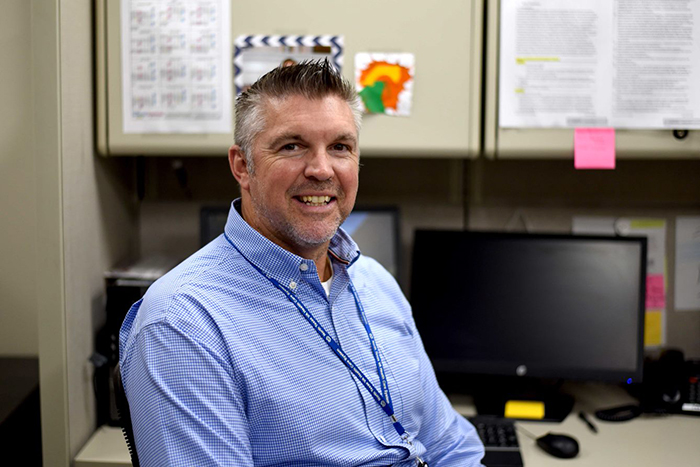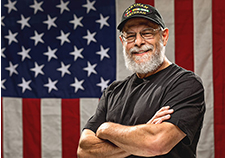Office of Research & Development |
 |
Office of Research & Development |
 |


Dr. Jason Flake is an investigator with the VA North Texas Health Care System in Dallas, Texas. His research focuses on justice system involved Veterans. (Photo by Jennifer Roy)
June 13, 2022
By Mike Richman
VA Research Communications
"The response from VA medical centers with respect to the number of submissions and enthusiasm for the program has been phenomenal over the last two years."
Dr. Jason Flake, a U.S. Air Force Veteran, is one of 10 researchers from underrepresented backgrounds who received a Diversity, Equity, and Inclusion Research Supplement Award.
VA’s Office of Research and Development formed the Diversity, Equity, and Inclusion Work Group two years ago. The group has four aims: to develop a diverse scientific workforce through training and funding opportunities; to stimulate research focused on minority health and health disparities; to promote a culture of inclusion in the workplace; and to support equity and diversity in scientific activities. One important goal of the DEI Work Group is to fund mentored research experiences for early career investigators from minority backgrounds.

VA ear surgeon studies management of severe hearing loss in Veterans

Veteran disability payments led to fewer hospitalizations

Air Force Veteran among 10 new awardees in VA diversity, equity, and inclusion research program

VA researcher leads project to evaluate Veteran screening for malnutrition
Flake is a research scientist at the VA North Texas Health Care System, where he tries to improve services for Veterans who have collided with the criminal justice system by focusing on rehabilitation needs and barriers. He’s leading a project in which health care providers and formerly incarcerated Veterans collaborate to identify priority goals including employment, housing, and substance use treatment. From there, the two sides identify and provide treatment options for the factors impacting these goals, which can include substance use, stigma, transition acclimation, networking and relationship building, and stress management.
Prior to becoming a researcher, Flake served for 20 years as a law enforcement officer in the Dallas-Fort Worth metroplex in Texas. He earned a master’s degree in criminal justice and criminology and a doctorate in public administration and public policy from the University of Texas at Arlington. His dissertation focused on how Veteran treatment court administrators make decisions about approving treatment plans based on their own status as a Veteran.
The DEI Work Group's Workforce Resources and Opportunities subcommittee is charged with creating funding opportunities in mentored research for junior VA investigators from underrepresented backgrounds. These awards, called DEI Research Supplement Awards, pair early career investigators with established VA researchers. Each DEI supplement awardee receives as much as $100,000 per year, for up to two years to fund their research and help prepare them to compete later for a VA Career Development Award. VA Research and Development funded an initial round of 10 DEI Research Supplement Awards in 2021.
Flake’s project mentor is Dr. James LePage, the associate chief of staff for research at the North Texas VA.
“I feel honored to be one of the 10 awardees,” Flake says. “To be selected out of many qualified and deserving applicants is humbling. My award not only highlights and recognizes my status as a Veteran, but more importantly, as a member of the larger Veteran community. I think it’s important that Veteran consumers are aware of the steps VA takes in making research more inclusive to a diversity of thoughts, experiences, and backgrounds, specifically Veteran researchers. These steps only serve to build trust in the larger Veteran community.
“I am also proud that our research that focuses on helping formerly incarcerated Veterans is highlighted and recognized nationally. This is an underserved population. Our efforts go beyond addressing more well-known barriers to reintegration, such as substance use or mental health, and tackle many other less-recognized issues like stigma.
“Overall, I think the DEI program is invaluable. Diversity of backgrounds, thoughts, and ideas is crucial in developing more well-rounded and inclusive research that serves to promote these concepts in the larger society, in which research resides.”
Dr. Carol Fowler, a health science officer in ORD, is leading the DEI Workforce Resources and Opportunities subcommittee.
“The response from VA medical centers with respect to the number of submissions and enthusiasm for the program has been phenomenal over the last two years,” she says. “We were able to award 10 supplements in the first year and 10 new supplements for 2022. The most rewarding aspect of this program for me is interacting with the mentees on quarterly calls and being involved in the career development of so many outstanding early career scientists.”
The DEI Work Group co-chair Dr. Mark Roltsch hopes the award supplements will help springboard the careers of junior VA researchers from underrepresented backgrounds.
“I strongly believe the diversity supplement program that we launched last year is one of the best programs that ORD offers early stage investigators from underrepresented backgrounds to begin to develop a VA research career. The quality of the applicants we have funded and the projects they are working on are truly outstanding. I look forward to seeing where these young investigators that we fund with the supplements are in their careers in five to 10 years.”
Click here to learn more about the VA researchers who received a 2022 DEI Research Supplement award.
VA Research Currents archives || Sign up for VA Research updates